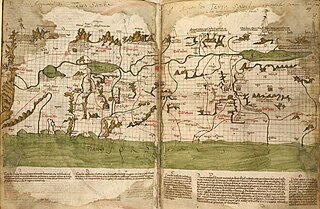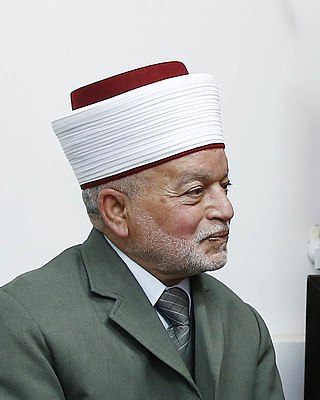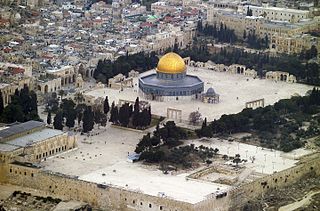Custodian may refer to:
Custodian may refer to:

The Church of the Holy Sepulchre, also known as the Church of the Resurrection, is a fourth-century church in the Christian Quarter of the Old City of Jerusalem. It is considered to be the holiest site for Christians in the world, as it has been the most important pilgrimage site for Christianity since the fourth century.

The Temple in Jerusalem, or alternatively the Holy Temple, refers to the two religious structures that served as the central places of worship for Israelites and Jews on the modern-day Temple Mount in the Old City of Jerusalem. According to the Hebrew Bible, the First Temple was built in the 10th century BCE, during the reign of Solomon over the United Kingdom of Israel. It stood until c. 587 BCE, when it was destroyed during the Babylonian siege of Jerusalem. Almost a century later, the First Temple was replaced by the Second Temple, which was built after the Neo-Babylonian Empire was conquered by the Achaemenid Persian Empire. While the Second Temple stood for a longer period of time than the First Temple, it was likewise destroyed during the Roman siege of Jerusalem in 70 CE.

The Temple Mount, also known as Haram al-Sharif, al-Aqsa Mosque compound, or simply al-Aqsa, and sometimes as Jerusalem's holyesplanade, is a hill in the Old City of Jerusalem that has been venerated as a holy site in Judaism, Christianity, and Islam for thousands of years.

The Aqsa Mosque, also known as the Qibli Mosque or Qibli Chapel, is the main congregational mosque or prayer hall in the Al-Aqsa mosque compound in the Old City of Jerusalem. In some sources the building is also named al-Masjid al-Aqṣā, but this name primarily applies to the whole compound in which the building sits, which is itself also known as "Al-Aqsa Mosque". The wider compound is known as Al-Aqsa or Al-Aqsa mosque compound, also known as al-Ḥaram al-Sharīf.

The Holy Land is an area roughly located between the Mediterranean Sea and the eastern bank of the Jordan River, traditionally synonymous both with the biblical Land of Israel and with the region of Palestine. Today, the term "Holy Land" usually refers to a territory roughly corresponding to the modern states of Israel and Palestine. Jews, Christians, Muslims, and Baháʼís regard it as holy.

Haram is one of several similar words originating from the triliteral Semitic root Ḥ-R-M. The word literally means "sanctuary," commonly used by Muslims to refer to Al-Masjid Al-Haram and Prophet Mohammad's Mosque. There are certain rules which Muslims within these two areas must follow.
The Supreme Muslim Council was the highest body in charge of Muslim community affairs in Mandatory Palestine under British control. It was established to create an advisory body composed of Muslims and Christians with whom the High Commissioner could consult. The Muslim leaders, however, sought to create an independent council to supervise the religious affairs of its community, especially in matters relating to religious trusts (waqf) and shariah courts. The British acceded to these proposals and formed the SMC which controlled waqf funds, the orphan funds, and shariah courts, and responsible for appointing teachers and preachers. The SMC continued to exist until January 1951, when it was dissolved by Jordan and its function transferred to the Jordanian Ministry of Awqaf.
Holy Land is a term used by Jews, Christians, and Muslims to describe the Land of Israel and Palestinian territories.

The holiest sites in Islam are predominantly located in the Arabian Peninsula and the Levant. While the significance of most places typically varies depending on the Islamic sect, there is a consensus across all mainstream branches of the religion that affirms three cities as having the highest degree of holiness, in descending order: Mecca, Medina, and Jerusalem. Mecca's Al-Masjid al-Haram, Al-Masjid an-Nabawi in Medina, and Al-Masjid al-Aqsa in Jerusalem are all revered by Muslims as sites of great importance.

The Foundation Stone, or the Noble Rock is the rock at the center of the Dome of the Rock in Jerusalem. It is also known as the Pierced Stone, because it has a small hole on the southeastern corner that enters a cavern beneath the rock, known as the Well of Souls.

The Custody of the Holy Land is a custodian priory of the Order of Friars Minor in Jerusalem, founded as the Province of the Holy Land in 1217 by Saint Francis of Assisi, who had also founded the Franciscan Order in 1209. In 1342, the Franciscans were declared by two papal bulls as the official custodians of the Holy Places in the name of the Catholic Church.

The Jerusalem Waqf and Al-Aqsa Mosque Affairs Department, also known as the Jerusalem Waqf, the Jordanian Waqf or simply the Waqf, is the Jordanian-appointed organization responsible for controlling and managing the current Islamic edifices on the Temple Mount in the Old City of Jerusalem, known to Muslims as Al-Aqsa, which includes the Dome of the Rock. The Jerusalem Waqf is guided by a council composed of 18 members and headed by a director, all appointed by Jordan. The current director of the Waqf, since 2005, is Sheikh Azzam al-Khatib.
Haramayn, is the traditional Islamic appellation of the two holiest cities of Islam, Mecca and Medina. It may also refer to:
Status quo is a Latin phrase meaning "the existing state of affairs".

The Status Quo is an understanding among religious communities with respect to nine shared religious sites in Jerusalem and Bethlehem. Other holy places in Israel and Palestine were not deemed subject to the Status Quo, because the authorities of one religion or community within a religion are in recognized or effective possession of them.
Haram is an Arabic term (حَرَام) 'forbidden'.

The Grand Mufti of Jerusalem is the Sunni Muslim cleric in charge of Jerusalem's Islamic holy places, including Al-Aqsa. The position was created by the British military government led by Ronald Storrs in 1918. Since 2006, the position has been held by Muhammad Ahmad Hussein, appointed by the Palestinian President, Mahmoud Abbas.

Hashemite custodianship refers to the Jordanian royal family's role in tending Muslim and Christian holy sites in the city of Jerusalem. The legacy traces back to 1924 when the Supreme Muslim Council, the highest Muslim body in charge of Muslim community affairs in Mandatory Palestine, chose Hussein bin Ali as custodian of Al-Aqsa. The custodianship became a Hashemite legacy administered by consecutive Jordanian kings.

On 15 April 2022, clashes erupted between Palestinians and Israeli Security Forces on the Al-Aqsa Compound in the Old City of Jerusalem. According to the United Nations Special Coordinator for the Middle East Peace Process, the clashes began when Palestinians threw stones, firecrackers, and other heavy objects at Israeli police officers. The policemen used tear gas shells, stun grenades and police batons against the Palestinians. Some Palestinians afterwards barricaded themselves inside the Al-Aqsa Mosque and proceeded to throw stones at the officers. In response, police raided the mosque, arresting those who had barricaded themselves inside. In addition, some damage was done to the mosque's structure.

The concept of Indigenous Australian traditional custodianship derives from Indigenous Australians' strong traditional connection with the lands and seas they inhabit, known collectively as "Country". The term "Traditional Custodian" is often used interchangeably with "traditional owners" in the context of native title in Australia, including in acknowledgements of Country. The role of a custodian, however, implies a responsibility to care for Country, reflecting a worldview that is not necessarily compatible with the Western concepts of land ownership and the right to property.